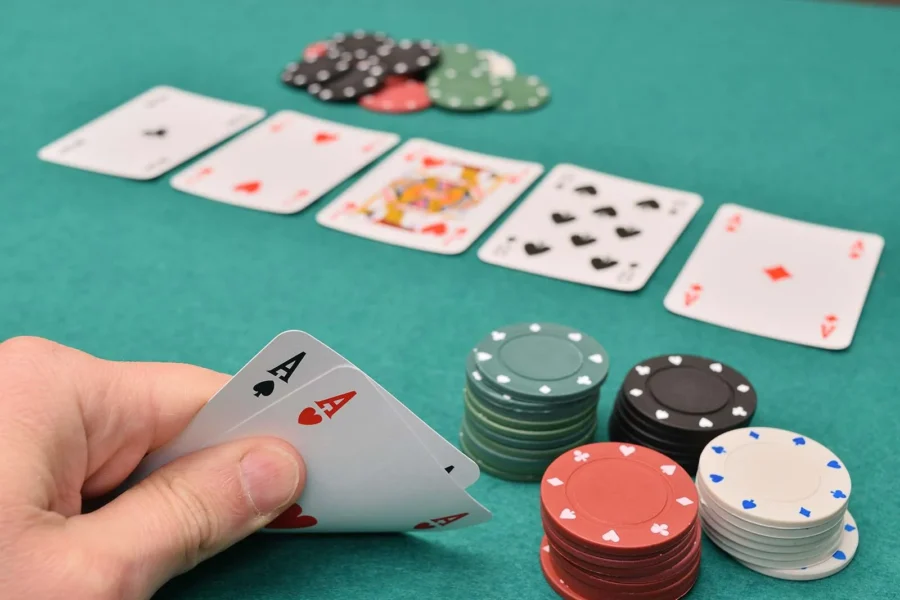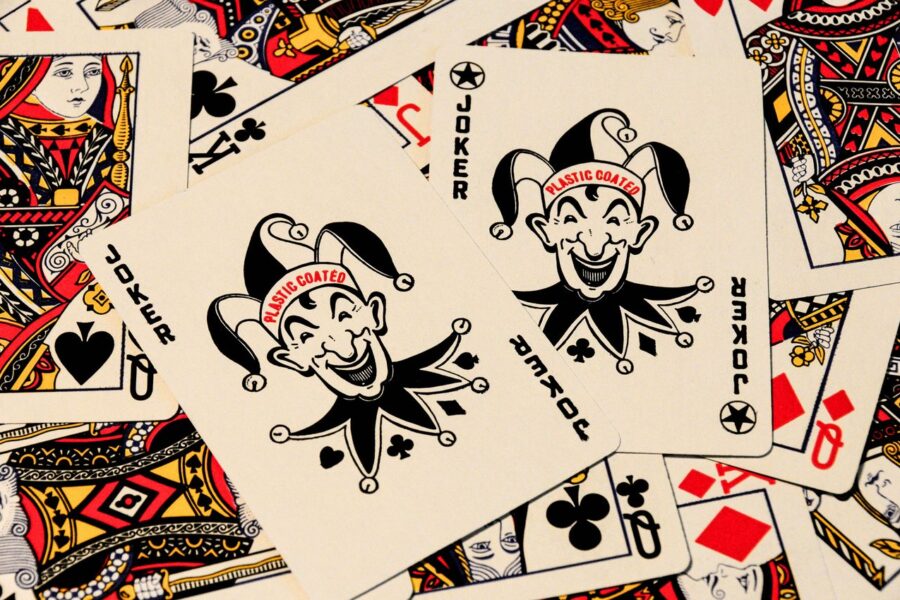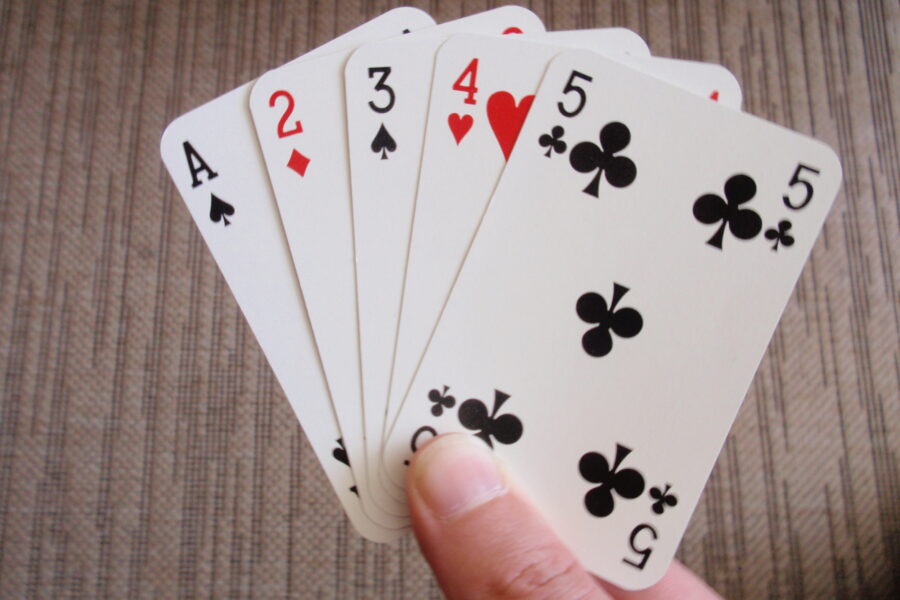What is Omaha High?
Omaha High is directly derived from classic Hold’em, which for years has been the most popular form of poker. Omaha High emerged in the 1970s and gained popularity in the following decades, becoming a serious alternative to Hold’em. One reason for its growing popularity is that it introduces more strategic and tactical elements to the game, attracting players seeking a greater challenge.
Omaha High enjoys increasing popularity among poker players worldwide, including in Poland. Major poker rooms and online platforms organize Omaha High tournaments, and the game is available in most land-based casinos. For many players, Omaha High provides a fresh alternative to classic Hold’em, offering new strategic and tactical challenges. The combination of more complex gameplay with a fast pace attracts more and more poker enthusiasts.
Basic Rules of Omaha High
In Omaha High, each player receives 4 starting cards and must then create the strongest five-card hand by combining 2 cards from their hand with 3 cards from the table (flop, turn, river). Unlike in Hold’em, you cannot use just 1 card from your hand. It’s important to understand how to combine your hand cards with the table cards to achieve the strongest possible hand.
How to Form a Winning Hand?
Omaha High follows the same hand hierarchy as other poker variants like Texas Hold’em. The strongest hand is, of course, a royal flush, followed by other combinations such as four of a kind, full house, flush, straight, three of a kind, two pairs, and a high card. However, due to the specifics of Omaha High, where you must use 2 cards from your hand and 3 cards from the table, some hands might differ slightly from those known in Hold’em.
Types of Hands in Omaha High
In Omaha High, learning how to create the strongest possible hands by combining 2 cards from your hand with 3 cards from the table is essential. Familiarizing yourself with the hand hierarchy and understanding how to adapt them to the specifics of Omaha High is crucial for success in this poker variant.
Strategies and Tactics in Omaha High
In Omaha High, table position is crucial as it affects when and with what cards you can enter the game. Players in position have an informational advantage, allowing them to make better decisions. Besides, skillful stack management—the size of the capital you have—is also important. Correctly determining when to increase or decrease stakes can have a huge impact on success in the game.
Table Position and Stack Management
In Omaha High, as in other poker variants, the ability to read opponents—guessing what cards they might have and what their intentions are—is extremely important. This allows for better decision-making during the game. Equally important is controlling emotions—avoiding mistakes due to stress, frustration, or excessive joy. Mastery and keeping your nerves in check are key traits of a successful Omaha High player.
Omaha High vs. Other Poker Variants
Although Omaha High is directly derived from the classic variant of Texas Hold’em, it differs significantly in many aspects. The key difference is the number of starting cards players receive—in Omaha High, it is 4 cards, while in Hold’em, players receive 2 cards. Additionally, in Omaha High, it is necessary to use 2 cards from your hand and 3 cards from the table (flop, turn, or river) to form the strongest possible five-card hand. This specificity makes Omaha High a much more strategically and tactically complex game, requiring more experience from players.
Despite these significant differences, Omaha High retains many similarities to Texas Hold’em. The same hand hierarchy applies, as do the betting rules and the basic objectives of the game, which are to create the strongest card combination and defeat opponents. However, due to the specifics of Omaha High, some elements, such as estimating the odds of winning or adjusting strategies to the phase of the game, require completely different skills than in classic Hold’em.
Odds and Probabilities in Omaha High
Calculating odds and probabilities plays a very important role in Omaha High, allowing players to make better decisions during the game. You need to learn basic calculations, such as determining the probability of hitting a particular card on the flop, turn, or river. Knowing these statistics enables the evaluation of whether your hand has enough chances to win or if it’s better to fold.
Calculating Winning Chances
There are many tools and software available that help Omaha High players analyze odds and probabilities. The most popular ones are poker calculators, which allow for detailed calculations of the odds of hitting desired cards and winning a hand. Using such tools can significantly improve decision-making during the game and contribute to increasing profits.
Using Hand Analysis Software
Hand analysis software in Omaha High provides players with valuable information about the probability of hitting key cards and increasing their chances of winning. Regular use of such tools allows for a better understanding of game mechanics and continuous improvement of strategies.
Threats and Traps in Omaha High
When playing Omaha High, you must be aware of potential threats and traps that can lead to significant losses. One of the most important threats is making wrong decisions due to insufficient knowledge of the rules, strategies, or probabilities. Therefore, continuous improvement of skills, keeping up with the latest trends, and avoiding hasty, emotional decisions are crucial. Only in this way can you minimize the risk of severe losses.
Avoiding Losses Due to Poor Decisions
It is very important for Omaha High players to continuously develop their skills and avoid making poor decisions that can lead to severe losses. Improving knowledge of the game rules, mastering strategies and tactics, and keeping up with the latest trends are key elements that will minimize the risk of losses. Additionally, players must learn to control emotions and avoid hasty, unconsidered moves. Only through systematic learning and practice can one become an effective Omaha High player.
Omaha High Tournaments
Omaha High is also gaining increasing popularity in poker tournaments. Players have the opportunity to compete in numerous events organized by the largest poker rooms and online platforms. Participating in Omaha High tournaments requires developing specific strategies, such as proper stack management, appropriate reactions to situations at small and big blinds, or adapting play style to the stage of the tournament. Knowing these tactics can significantly improve chances of success in Omaha High tournaments.
Tournament Strategies
In Omaha High tournaments, skillful time and stack management are extremely important. Players need to learn to adjust their strategies and decisions to the current phase of the tournament, the level of blinds, or the size of the capital they have. Poor management of these elements can lead to quick elimination from the tournament, so time must be dedicated to mastering these skills.
Is It Worth Playing Omaha High?
Omaha High is a fascinating poker variant that has been gaining increasing popularity among players worldwide in recent years. Its appeal lies in the greater complexity and strategic challenges compared to classic Texas Hold’em. Playing Omaha High requires mastering a range of skills, such as creating strong hands, managing stacks, reading opponents, and calculating probabilities.
Systematic learning and practice are crucial to achieving success at the table. We hope this article has provided you with valuable information to help you develop as an Omaha High player. Good luck!
Frequently Asked Questions
What is Omaha High and how to play?
Omaha High is a poker variant derived directly from classic Texas Hold’em. In Omaha High, each player receives 4 starting cards and must create the strongest five-card hand by combining 2 cards from their hand with 3 cards from the table (flop, turn, river).
What are the basic rules of Omaha High?
In Omaha High, the same hand hierarchy applies as in other variants of Texas Hold’em. However, players must remember to use 2 cards from their hand and 3 cards from the table, which differs from Hold’em, where you can use just 1 card from your hand.
What strategies and tactics are important in Omaha High?
In Omaha High, key elements include table position, skillful stack management, reading opponents, and controlling emotions. Developing your own strategy and tactics is essential for success in this game.
How should beginner Omaha High players play?
For beginner Omaha High players, the most important thing is systematically acquiring knowledge and practicing the game. It’s worth using available educational resources, such as articles, guides, and tutorials, to gradually improve your skills.
What are the similarities and differences between Omaha High and other poker variants?
Omaha High, although derived from Texas Hold’em, significantly differs from this classic variant. The key difference is the number of starting cards (4 in Omaha High instead of 2 in Hold’em) and the way the final hand is formed. Despite these differences, Omaha High retains many similarities with Hold’em, such as the hand hierarchy and betting rules.
How important are odds and probabilities in Omaha High?
Calculating odds and probabilities plays a very important role in Omaha High. Knowing basic calculations, such as determining the probability of hitting a given card, allows players to make better decisions during the game. Many tools and software, such as poker calculators, can help analyze these statistics.
What are the threats and traps to avoid in Omaha High?
One of the most important threats in Omaha High is making wrong decisions due to insufficient knowledge of the rules, strategies, or probabilities. Therefore, continuous improvement of skills and avoiding hasty, emotional decisions are crucial to minimize the risk of severe losses.
What is gameplay like in Omaha High tournaments?
Omaha High is also gaining increasing popularity in poker tournaments. Players need to develop specific tournament strategies, such as proper stack management, reacting to situations at small and big blinds, or adapting their play style to the tournament stage. Skillful time and stack management are key to success in Omaha High tournaments.






Leave a Comment